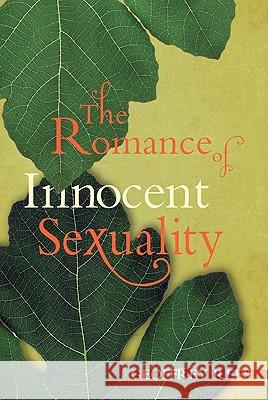The Romance of Innocent Sexuality » książka
The Romance of Innocent Sexuality
ISBN-13: 9781606086612 / Angielski / Miękka / 2011 / 336 str.
The Romance of Innocent Sexuality
ISBN-13: 9781606086612 / Angielski / Miękka / 2011 / 336 str.
(netto: 146,37 VAT: 5%)
Najniższa cena z 30 dni: 153,69
ok. 16-18 dni roboczych.
Darmowa dostawa!
Synopsis: From the polling place to the pulpit, The Romance of Innocent Sexuality investigates the passions that are enacted in debates about same-sex marriage. In a critique that is at once humorous and unrelenting, Geoffrey Rees argues that sexual desire is fundamentally a desire to make sense of oneself as a whole person. Through a constructive engagement with the writings of Saint Augustine on original sin, Rees turns on its head the conventional wisdom regarding the goodness of sexual relationship, arguing that sin, not innocence, is the starting point in pursing justice in sexual ethics. To that end Rees boldly reclaims the wisdom of the most disreputable teachings of the Augustinian tradition: that original sin is a literal inheritance of all humanity of the singular disobedience of Adam and Eve in Eden, and the inherent sinfulness of all human sexuality. This work also engages theological readings of nineteenth-century fiction and literary readings of contemporary theological writings. In so doing Rees shows that debates about same-sex marriage are so compelling because the participants are all telling a common story in which they seek to establish the innocence of their own preferred forms of self-understanding as defined against some other persons' sinful selves. In contrast to this, Rees argues for the acceptance of responsibility for the sinful exclusions that make possible finding the meaning of embodied personal identity through marriage between any two persons. Endorsements: "This is a highly original and provocative inquiry into the sexual politics of sin, marriage, and identity. Tackling sensitive and controversial material head on, Rees's tone is sober and serene. With Augustine and Foucault as guides, he crosses disciplinary boundaries between theology, philosophy, literature, and history with audacity and ease. Rees's book demonstrates how, when it comes to same-sex relations, the personal is deeply political and innocence is overrated. Here is a new religious ethics which generates a radically innovative conversation on the nature of original sin, death, and pleasure." --Richard Kearney Boston College "In this text Geoffrey Rees looks to the Augustinian tradition as providing constructive insights that are currently neglected, if not vilified, so that the tradition's association of sexuality and sin affords a corrective to the perfectionist and simplifying liberationist trends in contemporary discourse . . . he also considers romantic narrative conventions that appear in nineteenth-century literature, and claims, originally I believe, that they epitomize the strains in contemporary discourse on sexuality that extol its perfectionist and liberationist possibilities . . . in doing so, Rees shows himself to be an astute thinker and an engaging and elegant writer." --Gene Outka, Yale University Author Biography: Geoffrey Rees teaches health care ethics in the Department of Religion, Health, and Human Values at Rush University in Chicago, Illinois, where he also serves on the ethics consultation service.
Synopsis:From the polling place to the pulpit, The Romance of Innocent Sexuality investigates the passions that are enacted in debates about same-sex marriage. In a critique that is at once humorous and unrelenting, Geoffrey Rees argues that sexual desire is fundamentally a desire to make sense of oneself as a whole person. Through a constructive engagement with the writings of Saint Augustine on original sin, Rees turns on its head the conventional wisdom regarding the goodness of sexual relationship, arguing that sin, not innocence, is the starting point in pursing justice in sexual ethics. To that end Rees boldly reclaims the wisdom of the most disreputable teachings of the Augustinian tradition: that original sin is a literal inheritance of all humanity of the singular disobedience of Adam and Eve in Eden, and the inherent sinfulness of all human sexuality. This work also engages theological readings of nineteenth-century fiction and literary readings of contemporary theological writings. In so doing Rees shows that debates about same-sex marriage are so compelling because the participants are all telling a common story in which they seek to establish the innocence of their own preferred forms of self-understanding as defined against some other persons sinful selves. In contrast to this, Rees argues for the acceptance of responsibility for the sinful exclusions that make possible finding the meaning of embodied personal identity through marriage between any two persons.Endorsements:"This is a highly original and provocative inquiry into the sexual politics of sin, marriage, and identity. Tackling sensitive and controversial material head on, Reess tone is sober and serene. With Augustine and Foucault as guides, he crosses disciplinary boundaries between theology, philosophy, literature, and history with audacity and ease. Reess book demonstrates how, when it comes to same-sex relations, the personal is deeply political and innocence is overrated. Here is a new religious ethics which generates a radically innovative conversation on the nature of original sin, death, and pleasure."--Richard KearneyBoston College"In this text Geoffrey Rees looks to the Augustinian tradition as providing constructive insights that are currently neglected, if not vilified, so that the traditions association of sexuality and sin affords a corrective to the perfectionist and simplifying liberationist trends in contemporary discourse . . . he also considers romantic narrative conventions that appear in nineteenth-century literature, and claims, originally I believe, that they epitomize the strains in contemporary discourse on sexuality that extol its perfectionist and liberationist possibilities . . . in doing so, Rees shows himself to be an astute thinker and an engaging and elegant writer."--Gene Outka,Yale UniversityAuthor Biography:Geoffrey Rees teaches health care ethics in the Department of Religion, Health, and Human Values at Rush University in Chicago, Illinois, where he also serves on the ethics consultation service.











